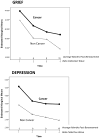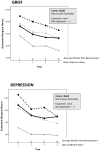Spousal Bereavement Following Cancer Death
- PMID: 24729669
- PMCID: PMC3982618
- DOI: 10.2190/IL.21.3.b
Spousal Bereavement Following Cancer Death
Abstract
Loss due to cancer could predispose surviving spouses or partners to a variety of negative outcomes. Although a terminal prognosis may provide opportunities to prepare for the loss, existing evidence is inconclusive as to whether death expectedness buffers potentially negative bereavement outcomes. Using data from the Living After Loss study, we examined longitudinally outcomes of bereaved individuals whose spouses/partners died from cancer (n = 112) versus other causes (n = 213) while accounting for death expectedness. While most of the cancer deaths were expected, more than half of the non-cancer deaths were not. The lowest levels of depression, grief, and loneliness over time were among those whose spouses/partners died expectedly from causes other than cancer. Cancer-bereavement was as equally distressing as any unexpected death. Future efforts should focus on the mechanisms underlying these outcomes and develop effective and early interventions to those in greatest need.
Figures




Similar articles
-
Resilience and vulnerability: prolonged grief in the bereaved spouses of marital partners who died of AIDS.AIDS Care. 2016;28(4):441-4. doi: 10.1080/09540121.2015.1112354. Epub 2015 Nov 17. AIDS Care. 2016. PMID: 26573556
-
Spouses bereaved by suicide: A population-based longitudinal cohort comparison of physician-diagnosed mental disorders and hospitalized suicide attempts.J Psychiatr Res. 2020 Nov;130:347-354. doi: 10.1016/j.jpsychires.2020.07.028. Epub 2020 Aug 8. J Psychiatr Res. 2020. PMID: 32882576
-
An exploration of spousal caregivers' well-being after the death of their partners who were older cancer patients - A phenomenological approach.Eur J Oncol Nurs. 2020 Aug;47:101779. doi: 10.1016/j.ejon.2020.101779. Epub 2020 Jun 11. Eur J Oncol Nurs. 2020. PMID: 32559712
-
Learnings from supporting traumatic grief in the aftermath of sudden epilepsy deaths.Epilepsy Behav. 2020 Feb;103(Pt B):106416. doi: 10.1016/j.yebeh.2019.07.017. Epub 2019 Jul 30. Epilepsy Behav. 2020. PMID: 31375415 Review.
-
Psychosocial outcomes in cancer-bereaved children and adolescents: A systematic review.Psychooncology. 2018 Oct;27(10):2327-2338. doi: 10.1002/pon.4863. Epub 2018 Sep 11. Psychooncology. 2018. PMID: 30120901
Cited by
-
The Bereavement Experience for Partners of Patients With Central Nervous System Tumors.Oncol Nurs Forum. 2022 Mar 1;49(2):151-157. doi: 10.1188/22.ONF.151-157. Oncol Nurs Forum. 2022. PMID: 35191902 Free PMC article. Clinical Trial.
-
The mental health, quality of life and life satisfaction of internally displaced persons living in Nakuru County, Kenya.BMC Public Health. 2015 Aug 6;15:755. doi: 10.1186/s12889-015-2085-7. BMC Public Health. 2015. PMID: 26246147 Free PMC article.
-
Cancer Bereavement and Depression Symptoms in Older Spouses: The Possible Modifying Role of the Circadian Rest-Activity Rhythm.Clin Gerontol. 2021 Mar-Apr;44(2):126-132. doi: 10.1080/07317115.2020.1812787. Epub 2020 Aug 28. Clin Gerontol. 2021. PMID: 32856562 Free PMC article.
-
Therapist-Assisted Web-Based Intervention for Prolonged Grief Disorder After Cancer Bereavement: Randomized Controlled Trial.JMIR Ment Health. 2022 Feb 8;9(2):e27642. doi: 10.2196/27642. JMIR Ment Health. 2022. PMID: 35133286 Free PMC article.
-
Development of loneliness and social isolation after spousal loss: A systematic review of longitudinal studies on widowhood.J Am Geriatr Soc. 2025 Jan;73(1):253-265. doi: 10.1111/jgs.19156. Epub 2024 Aug 22. J Am Geriatr Soc. 2025. PMID: 39175111
References
-
- Barry LC, Kasl SV, Prigerson HG. Psychiatric disorders among bereaved persons: The role of perceived circumstances of death and preparedness for death. American Journal of Geriatric Psychiatry. 2002;10(4):447–457. - PubMed
-
- Burton AM, Haley WE, Small BJ, Finley MR, Dillinger-Vasille M, Schonwetter R. Predictors of well-being in bereaved former hospice caregivers: The role of caregiving stressors, appraisals, and social resources. Palliative and Supportive Care. 2008;6(2):149–158. doi: 10.1017/S1478951508000230. - DOI - PubMed
-
- Carr D. A “good death” for whom? Quality of spouse’s death and psychological distress among older widowed persons. Journal of Health and Social Behavior. 2003;44(2):215–232. - PubMed
Grants and funding
LinkOut - more resources
Full Text Sources
Other Literature Sources
